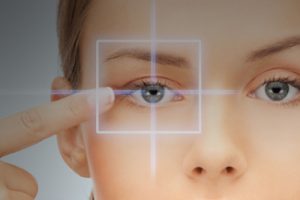People say your eyes are the window to your soul. But did you know they can be the window to your health?
Most people know when they get red, itchy eyes that their allergies are kicking in. But other eye problems, such as blurry vision, can be an indication of a serious health condition.
Which is why it’s important to add regular eye exams to your healthcare routine.
During an eye exam, your eye doctor can learn a lot about your overall health. For example, your doctor may spot signs that you have heart disease or diabetes, and even signs that you may have cancer.
Regular eye exams facilitate early detection and treatment for various health conditions. Find out which eye problems could be a sign of something more serious.
Sudden vision loss
A sudden and drastic loss of vision may indicate that not enough blood is reaching your eyes or brain.
Sudden and immediate vision loss could be an early sign of a stroke or the start of a migraine headache. Sudden vision loss can also be caused by a brain tumor, a retinal bleed or retinal detachment.
Blurred vision
Blurred vision can be an indication of dry eyes or diabetes.
Diabetes is caused by an excess of sugar in the blood. Diabetic retinopathy occurs when tiny blood vessels in your eyes leak blood and other fluids, causing blurry vision and threatening vision loss. Diabetes can also make it difficult to see at night or in dim light.
Bulging eyes
Thyroid gland dysfunction, such as Grave’s disease, causes protruding or bulging eyes.
Graves’ disease causes your thyroid gland to produce excessive hormones, which can cause double vision and vision loss.
With graves’ disease, your immune system attacks the tissue around the eyes, causing them to swell and push forward, giving them a “bulging” appearance.
Droopy Eyelid
A droopy eyelid can be caused by a stroke, an eyelid or brain tumor, or cancer of the nerves or muscles.
Droopy eyelids could be a symptom of myasthenia gravis, a disease that causes your immune system to attack your muscles and weaken them.
Myasthenia gravis affects eye, facial and throat muscles more than others, making chewing, swallowing and even speaking difficult for some people.
SEE RELATED: Does Smoking Affect the Eyes?
Contact an eye doctor near you if you’ve experienced any changes to your vision or appearance of your eyes.
Whites of your eyes appear yellow
Jaundice is a condition in which your skin and eyes appear yellow.
Jaundice is usually a sign of liver problems, caused by elevated bilirubin levels. The liver produces more bilirubin when it’s inflamed or damaged. The liver can become damaged by poor diet, cancer, infection, or prolonged alcohol misuse.
Sun damage may also cause small yellow spots on your eyes.
Rings around the cornea
Corneal arcus is a condition that causes a gray-white line of fat deposits on the edge of your cornea, this can be a sign of cardiovascular disease.
These deposits can sometimes form a complete white-colored ring on the cornea. For those who are over 50 this is usually of little concern, however, if you are younger than 40, contact an eye doctor, since the condition can signal cardiovascular disease.
Eye twitches
These are exceedingly common, generally harmless, and typically disappear on their own. They have been linked to alcohol and caffeine consumption, fatigue, insufficient sleep, stress, and smoking.
Frequent eye twitches could be an indication of a neurological system disease, such as multiple sclerosis (MS).
If your twitches are caused by MS or another nervous system disorder, you may also experience additional symptoms such as trouble with walking or maintaining balance.
Night Blindness
If you have trouble seeing in dim light, you may be developing cataracts or retinitis pigmentosa.
In rare cases, night blindness can be due to a vitamin A deficiency. Supplements or a diet rich in vitamin A-rich foods such as beef liver, sweet potatoes, spinach, carrots, and pumpkins are generally recommended to treat the deficiency and improve night vision.
Another rare but serious cause of night blindness is retinitis pigmentosa.
Eye floaters
Constantly seeing eye floaters may indicate an ocular emergency, such as a detached retina, that requires immediate medical attention.
Usually floaters are not a symptom of anything serious, but if you notice lightning flashes, flickering of lights or darkness in your field of vision, you may be having a serious retinal condition.
These symptoms are often the same as those that occur before a major headache or migraine attack. An increase in the number of floaters can also be a sign of diabetes or brain tumor.
LEARN MORE: Guide to Eye Health
Schedule a regular comprehensive eye exam with an eye doctor near you, so that they can detect any underlying health condition early.
During an eye exam your eye doctor can learn a lot about your overall health, such as the early signs of heart disease or diabetes, and possibly even cancer.
Regular eye exams can lead to early detection and successful treatment for many health conditions.









